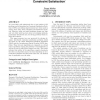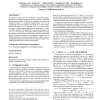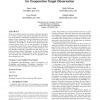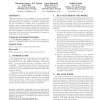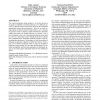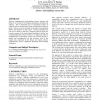ATAL
2005
Springer
15 years 6 months ago
2005
Springer
ATAL
2005
Springer
15 years 6 months ago
2005
Springer
110
Voted
ATAL
2005
Springer
15 years 6 months ago
2005
Springer
We present an approach to the verification of temporal epistemic properties in synchronous multi-agent systems (MAS) via bounded model checking (BMC). Based on the semantics of s...
81
Voted
ATAL
2005
Springer
15 years 6 months ago
2005
Springer
Multi-agent problem domains may require distributed algorithms for a variety of reasons: local sensors, limitations of communication, and availability of distributed computational...
102
Voted
ATAL
2005
Springer
15 years 6 months ago
2005
Springer
The rapid changing business environment of high-tech asset intensive enterprises such as semiconductor manufacturing constantly drives production managers to look for better solut...
86
Voted
ATAL
2005
Springer
15 years 6 months ago
2005
Springer
This paper presents the key features of a new negotiation model for autonomous agents. The model is generic, handles multi-party and multi-issue negotiation, acknowledges the role...
63
Voted
ATAL
2005
Springer
15 years 6 months ago
2005
Springer
In the article we present two untraceability protocols for mobile agents. Comparing to other solutions, the advantage of the protocols is that they support agent’s autonomy in c...
101
Voted
ATAL
2005
Springer
15 years 6 months ago
2005
Springer
The central mechanism design problem is to develop incentives for agents to truthfully reveal their preferences over different outcomes, so that the system-wide outcome chosen by ...
104
Voted
ATAL
2005
Springer
15 years 6 months ago
2005
Springer
Matchmaking will be an important component of future agent and agent-like systems, such as the semantic web. Most research on matchmaking has been directed toward sophisticated ma...
118
Voted
ATAL
2005
Springer
15 years 6 months ago
2005
Springer
Software comprehension (understanding software structure and behavior) is essential for developing, maintaining, and improving software. This is particularly true of agent-based s...
